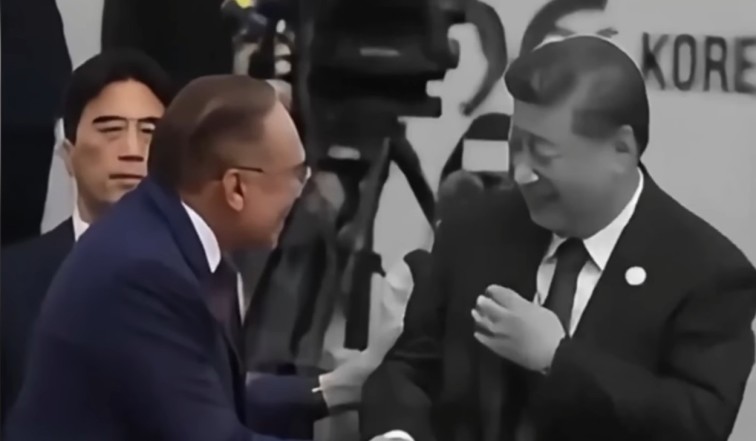Trump widened his eyes, holding back laughter as he watched Xi Jinping read his notes with his head down. (Video screenshot)
[People News] On October 30, during his meeting in South Korea with U.S. President Donald Trump, Chinese Communist Party (CCP) leader Xi Jinping turned into what observers called a “speech-reading machine.” For the entire 1 hour and 40 minutes, Xi rigidly read his prepared script word for word without deviation—showing an unusually conciliatory attitude toward the U.S. He didn’t dare say “no” to any of Washington’s demands, and the usual “wolf warrior” aggressiveness had completely vanished. No wonder Trump gave the meeting a “12 out of 10,” saying he was “super satisfied.”
What’s more, the next day Trump revealed in a 60 Minutes interview with CBS that Xi Jinping and his team had directly and verbally guaranteed that Beijing would not take any military action against Taiwan during Trump’s presidency.
According to multiple foreign media reports, on October 31, Trump sat for an interview at his Mar-a-Lago estate in Florida with the CBS News program 60 Minutes. The segment aired on November 2. The interview covered a wide range of issues—U.S.–China relations, Venezuela, Israel, the U.S. government shutdown, immigration, and the deployment of the National Guard.
When the topic turned to Taiwan, Trump stated:“He (Xi Jinping) said it publicly, and his team also said it during the meeting: ‘During President Trump’s term, we will never take any action,’ because they know what the consequences would be.”
Trump reiterated:“Xi Jinping never mentioned the issue during our meeting, which surprised some people. But he didn’t bring it up because he understands—he understands that very clearly.”
Since the CCP’s lack of honesty is universally known, the interviewer naturally followed up: if Beijing were to attack Taiwan, would President Trump order U.S. military intervention?
Trump didn’t answer directly. Instead, he replied:“If that ever happens, you’ll know the result. He (Xi Jinping) knows the answer too.”
Trump’s words implied confidence and served as a warning to the CCP.
According to the Independent (U.K.), the Trump administration earlier this summer declined to approve a $400 million military aid package to Taiwan.
Analysts interpreted this as evidence that the Trump administration already knew the CCP no longer had the courage—or capability—to attack Taiwan. Over the past two years, nearly all of China’s top generals have been purged in sweeping military crackdowns. Most of those ousted were Xi’s own loyalists, leaving him largely stripped of real military power.
Meanwhile, Vice Chairman of the Central Military Commission He Weidong and Political Work Department head Miao Hua reportedly launched two failed coup attempts to help Xi regain control of the military. Sources claim Miao Hua alone confessed to implicating more than 1,300 officers.
Citing New Tang Dynasty Television (NTD), Chinese law scholar Yuan Hongbing, now residing in Australia, said that from the first day of his detention, Miao Hua entered a frenzied, hysterical state—staying awake for 24 hours and writing over 80 denunciation reports in a single day.
He allegedly listed key officers—commanders of the People’s Armed Police, former army and navy political commissars—both active and retired generals. Together with his three detained secretaries, Miao Hua ultimately named over 1,300 military personnel, including civilian officers. The scandal reportedly triggered massive panic throughout the CCP and the military system.
Observers commented that although Xi Jinping has repeatedly and publicly vowed never to renounce the option of “military reunification with Taiwan,” the extensive purges have crippled the CCP’s combat readiness. With his military faction dismantled and his control greatly weakened, Xi simply lacks the power to initiate war across the Taiwan Strait.
Under such circumstances, Xi had little choice but to bow to reality and offer Trump a gesture of goodwill—verbally promising not to use force against Taiwan during Trump’s presidency.
Foreign media noted that the White House declined to provide further details on when or how Xi or CCP officials conveyed this assurance to Trump.
Under the 1979 Taiwan Relations Act, the United States is not formally obligated to defend Taiwan, but it is legally required to ensure Taiwan’s capacity for self-defense.
△











News magazine bootstrap themes!
I like this themes, fast loading and look profesional
Thank you Carlos!
You're welcome!
Please support me with give positive rating!
Yes Sure!